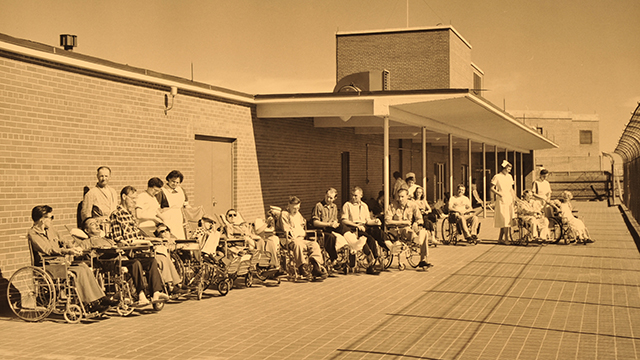
Polio patients enjoying sun and fresh air on top of the University of Alberta Hospital. Photo credit: Medical Photography, University of Alberta Hospital.
For many people today, polio is a cautionary tale-not something they have ever had to fear, largely thanks to an effective vaccine. But polio and its impacts are very real for a panel of speakers who will be at the upcoming Faculty of Medicine & Dentistry's History of Medicine public lecture titled Western Canada's Fight Against Polio Before the Vaccine.
In 1953, Canada experienced its worst polio epidemic on record. An estimated 11,000 people in Canada were left paralyzed by polio between 1949 and 1954. The disease peaked in 1953 with nearly 9,000 cases and 500 deaths. In Alberta, the number of cases shot up from 82 annually to 1,472.
Event details
Western Canada's fight against polio before the vaccine
March 14, 2018 7 to 9 p.m.
Bernard Snell Hall 8440 112 St NW, Edmonton (located in the University of Alberta Hospital, near the 112th Street entrance)
Featuring keynote speaker:
Stephen E. Mawdsley, PhD, FHEA
Lecturer in Modern American History
University of Alberta alumnus
University of Bristol
Panel discussion following the keynote featuring:
Amy Samson, Historian, Faculty of Medicine & Dentistry, University of Alberta
Stephen Mawdsley, Lecturer in Modern American History, University of Bristol
Neil Brown, Professor Emeritus, Division of Pulmonary Medicine, Department of Medicine, Faculty of Medicine & Dentistry, University of Alberta
Marion Chomik, Polio Survivor
Stan Houston, Professor, Division of Infectious Diseases, Department of Medicine, Faculty of Medicine & Dentistry, University of Alberta Free Admission, all are welcome.
RSVP here.
Sponsored by:
This event is supported by the Dean's Initiative in The History of Medicine and the Alberta Medical Foundation.
Polio shaped health care in Edmonton and Alberta. Alberta was the first province to join the vaccine field trial sponsored by the American National Foundation for Infantile Paralysis (NFIP), and the only one to have province-wide participation. There was also a Polio Sufferers Act which provided government-funded care for polio treatment and after-care before there was universal health care.
Polio also sparked the beginning of interdisciplinary care at the University of Alberta Hospital (UAH) and the Intensive Care Unit we know today is a direct legacy of the polio ward.
Polio expert panel includes a survivor
Polio survivor Marion Chomik was living outside of Edmonton in the 1960s when he contracted polio and was cared for at the UAH and later at the Aberhart Centre.
Chomik's experience is unique because he skipped school the day the polio vaccine was administered and later contracted the disease. The vaccine came out in the mid-1950s and by the 1960s most people were vaccinated.
Chomik spent decades living in the hospital. During this time, he and other patients developed close relationships with the staff and each other. Don Scott, a polio survivor and the first Head of the Department of Computing Science in the Faculty of Science at the U of A, offered computer programming training to a small group of interested polio patients. In one case, the School of Dentistry created a mouthpiece that allowed a boy to input data with his tongue. The patients later set up the first customized computer programming company in Edmonton called Prodata services. IBM eventually took over the company.
Chomik is passionate about sharing his story so that people recognize the effects that skipping vaccines can have on individuals, families and society.
Neil Brown, a panel speaker and professor emeritus in the U of A Department of Medicine, worked in the polio wing at the Aberhart Centre.
The keynote speaker Steve E. Mawdsley's work focuses on the first clinical trials for the polio vaccine and how the media shaped public perception of the vaccine. We see media playing a similar role in the public perception of vaccines today as the anti-vaccination movement grows around the globe.
Although North Americans are sheltered from polio, it is still prevalent in Afghanistan, Pakistan and Nigeria. U of A infectious disease professor and physician Stan Houston will discuss if the disease can ever truly be eradicated.